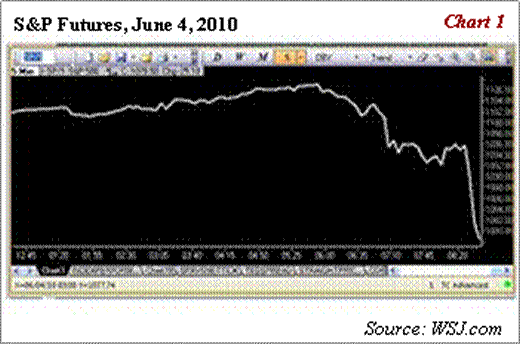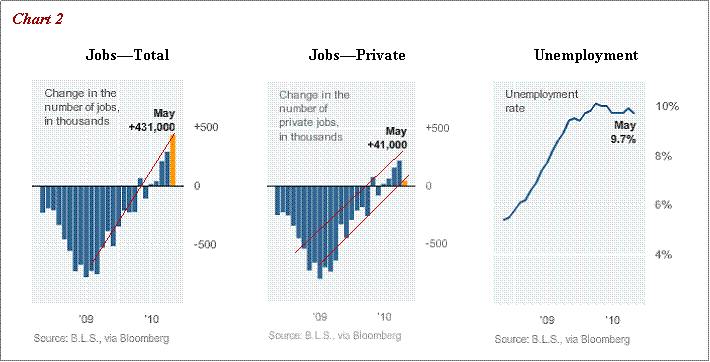Stock Market Precipitous Sell-off, Was the Jobs Report That Bad?
Stock-Markets / Stock Markets 2010 Jun 06, 2010 - 02:00 PM GMTBy: Dian_L_Chu
 A precipitous sell-off in the stock market took place last Friday (Chart 1) as the Labor Department’s May monthly report showed that job growth was weak in the private sector. The NYSE had to invoke “Rule 48″ again, marking the fifth time this year it has used the rare rule, which is intended to help smooth the opening following volatile futures action.
A precipitous sell-off in the stock market took place last Friday (Chart 1) as the Labor Department’s May monthly report showed that job growth was weak in the private sector. The NYSE had to invoke “Rule 48″ again, marking the fifth time this year it has used the rare rule, which is intended to help smooth the opening following volatile futures action.
So the employment report disappointed, but was it really as bad as evidenced by such a disproportionate selloff?

Market Mis-Expectation
The answer is no, it only failed relative to an incredibly optimistic benchmark set by some economists and the media, not to mention the Obama administration who mismanaged expectations.
The headline numbers for May do suggest reason for optimism — employers added 431,000 jobs and the jobless rate fell to 9.7%, from 9.9 % in April. However, the majority of focus is fixated on that almost all of the growth came from the 411,000 temporary workers hired by the Census Bureau, and the private sector created 41,000 positions, far short of the over-optimistic expectations for 150,000 to 180,000 jobs.
Hype & Over-Reaction
One needs to bear in mind that the big picture for the employment report should be based upon the following rationale: Are we better off in terms of job losses compared to a year ago, six months, three months, last month etc.? In other words, are we trending in the right direction, from 500,000 job losses each month to finally being net positive in job gains?
There is a tendency on Wall Street and the world in general to overreact to news events, and economic reports are not immune to this phenomenon. This kind of knee-jerk reaction to every micro bit of news is part and parcel of the sensationalistic news media model that has been employed to drive ratings and sell advertising space.
This often distorts the true significance of news events, and in the case of the latest jobs report, the underlying positive trend that is taking place in the employment environment.
If “Employment” Were A Stock
If one was trading this stock called ‘Employment’ and we graphed the year over year numbers on a chart it would appear quite bullish. (Chart 2)

In fact, this graphed line would be a trend trader`s dream stock to trade as we are in a marked uptrend which is steadily rising at a right angle, and will probably remain bullish, putting in higher highs and higher lows, for the next five years.
Big Picture - Trending Up
So the big picture of the employment trend needs to be the key takeaway from the latest jobs report, and not the extreme short-term reactionary view represented by Friday`s selloff in the market.
Eventually Corporations will start to feel more confident in the economic recovery to start putting those profits to work in pursuing new growth opportunities which require more risk.
And these new growth opportunities will require droves of new employees which will further reinforce the positively trending employment reports for the next five years, thus reducing another jobs figure some economists tend to focus on - the number of Americans out of work for 27 or more weeks--which remained at historical high.
Selloff = Bargains
With interest rate likely to remain zero for the rest of the year as one benefit for US investors due to another over-hyped news scenario in the European sovereign deficit scare, and speculations of stimulus 2.0, there are some real bargains in the market which will be snapped up ahead of the next earnings cycle as corporate productivity and profits are quite robust right now in the business cycle.
Overall, the labor market is trending in the positive direction. Smart investors would focus on the fact that the US economy is improving vs. three months ago, and take the recent selloff as bargain hunting opportunity, particularly in the resource sector, to enhance your portfolio.
Disclosure: No Positions
Dian L. Chu, M.B.A., C.P.M. and Chartered Economist, is a market analyst and financial writer regularly contributing to Seeking Alpha, Zero Hedge, and other major investment websites. Ms. Chu has been syndicated to Reuters, USA Today, NPR, and BusinessWeek. She blogs at Economic Forecasts & Opinions.
© 2010 Copyright Dian L. Chu - All Rights Reserved Disclaimer: The above is a matter of opinion provided for general information purposes only and is not intended as investment advice. Information and analysis above are derived from sources and utilising methods believed to be reliable, but we cannot accept responsibility for any losses you may incur as a result of this analysis. Individuals should consult with their personal financial advisors.
© 2005-2022 http://www.MarketOracle.co.uk - The Market Oracle is a FREE Daily Financial Markets Analysis & Forecasting online publication.



